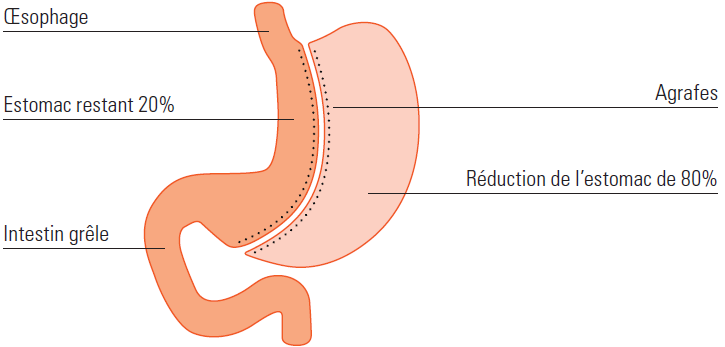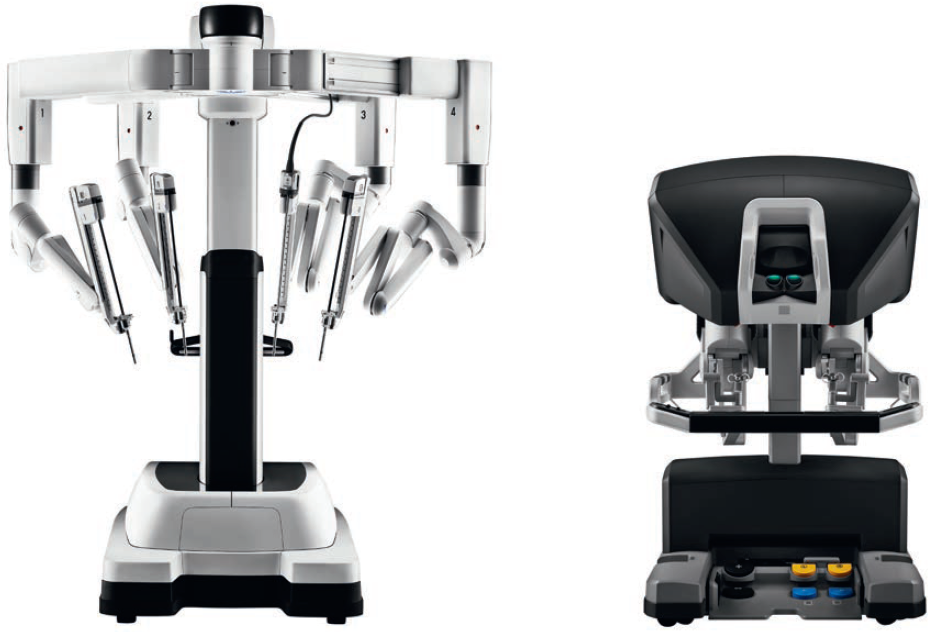- How does the procedure work ?
- How do I lose weight ?
- Who cannot benefit from the intervention ?
- How is the intervention carried out ?
- What is the expected weight loss ?
- What is the duration of the intervention and the length of hospital stay ?
- What are the possible complications ?

How does the procedure work ?
More rarely used in our institution, this technique acts only by causing restriction by reducing the size of the stomach.
How do I lose weight ?
Since your stomach is much smaller, you will be able to eat only small amounts of food, which will subsequently result in weight loss.
Who cannot benefit from the intervention ?
If you are suffering from gastroesophageal reflux disease or a hiatal hernia, this procedure is not indicated for you.
+ INFO
Sleeve gastrectomy can worsen your gastroesophageal reflux disease. Gastric bypass would be more indicated if you suffer from this condition.
How is the intervention carried out ?
The surgery is performed under general anaesthesia, using a minimally invasive approach (keyhole surgery) usually with the surgical robot. Briefly, a camera is inserted through a small hole in the abdominal wall and instruments are inserted through four other small holes.
The stomach is divided using a surgical stapler. Approximately 80% of the stomach is removed. The residual stomach is reduced to a banana-shaped, narrow tube (hence the name “sleeve”). At the end of the procedure, the incisions are closed with absorbable suture (which disappears on its own). Wound dressing is made with glue, which is also eliminated on its own.
What is the expected weight loss ?
The sleeve gastrectomy technique allows to lose about 50-65% of the excess weight. Most studies show that patients loose slightly less weight with the sleeve gastrectomy compared to the gastric bypass.
To give you an example, if your current weight is 130 kg and your ideal weight (i.e. the weight which will give you a BMI of 25) is 70 kg, your excess weight is 60 kg. After a sleeve gastrectomy, you can expect to lose approximately 50-65% of these 60 kg, which means between 30 and 40 kg.
Please be aware that these are only estimates, based on large number of patients who underwent sleeve gastrectomy surgery. Individual results might vary.

What is the duration of the intervention and the length of hospital stay ?
The operation takes between 1 and 2 hours. Most patients stay three nights in the hospital.
What are the possible complications ?
Complications of obesity surgery are rare but can unfortunately occur.
In the days following the intervention
- A leak of the staple line on the stomach. Antibiotics, drainage or surgery might be required.
- Other complications occur in approximately 1% of patients, and include: haemorrhage, intestinal obstruction, abscess, pulmonary embolism.
More than 30 days after the intervention
- Narrowing or dilation of the remaining stomach.
- Gastroesophageal reflux disease with inflammation of the oesophagus, which requires appropriate drug therapy.
- Vitamins and/or micronutrients deficiencies, which can be treated by adjusting the dose of vitamins/micronutrients supplementation.
